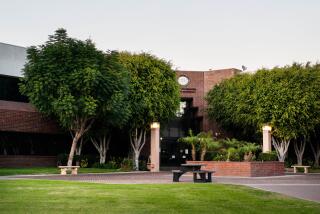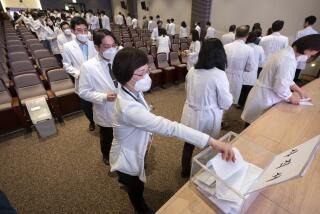2 King/Drew Programs Shut Down
- Share via
Training programs for 53 aspiring surgeons and radiologists at Martin Luther King Jr./Drew Medical Center were eliminated last week in a move that will increase the workload of a hospital staff already buffeted by allegations of poor patient care.
The Accreditation Council for Graduate Medical Education revoked the hospital’s right to train radiologists in 2002 and surgeons in 2003 after finding poor oversight of both programs. Both were allowed to continue until Wednesday, the end of the academic year.
The loss will cost King/Drew 15 radiology residents and 38 surgery residents. There are now fewer than 300 residents -- specialists in training who already have graduated from medical school -- at the Willowbrook hospital, just south of Watts. The backbone of many urban hospitals, residents perform a wide range of duties.
At King/Drew, radiology residents interpreted X-rays, for example, while the surgical residents performed operations under the eye of staff doctors and provided both pre- and post-operative care to patients.
“It’s going to be hard, and [experienced] surgeons are going to have to work harder,” said Dr. Roger Peeks, the hospital’s medical director. “They fully understand it and by now they’ve had a year to soak it in, but they’ll have to accept it again once they start doing” the extra work.
Peeks said King/Drew is looking to hire three or four experienced surgeons to help with the workload and that it will also rely on physician assistants working under doctors’ supervision.
He also said that the hospital will likely have to replace most of its remaining radiology staff -- about eight or nine doctors -- who Peeks said are expected to leave the hospital because they would rather work in an academic setting.
For now, the hospital will rely on temporary radiologists to take the place of residents. Eventually, Peeks said, the hospital is hoping to contract with a private firm to run the department.
The change comes as King/Drew is scrambling to fix other problems. The hospital was repeatedly cited by health inspectors this year who alleged the King/Drew jeopardized the welfare of its patients.
Peeks said the loss of the residents will not affect the welfare of patients at the hospital.
“We’re talking about residents and their main goal is education,” said Peeks. “We lose the ability to train, but we don’t lose the ability to take care of patients -- the attending physicians were always the ones in charge of the primary care.”
King/Drew has 16 other residency programs. One of those, neonatal-perinatal, also has lost its accreditation and will be forced to close next June.
Marcelle Willock, the medical school dean at the Charles R. Drew University of Medicine and Science, an affiliate of King/Drew, said she hopes to have the surgery program reinstated for the 2006-07 academic year.
Peeks said that the loss of the surgical residents may affect the hospital’s trauma service, which may not be able to handle as many cases.
More to Read
Sign up for Essential California
The most important California stories and recommendations in your inbox every morning.
You may occasionally receive promotional content from the Los Angeles Times.













